Popular Tool Used for Continuous Integration
Poorly managed development projects are bound to crash eventually. It's likely happened to you a dozen of times already. While writing code can be a lot of fun, managing code and dependencies can quickly become a maze of its own when you're dealing with the continuous growth of your codebase and feature branches. At Stackify, we aim to make the lives of developers easier (and less frazzling). One way to de-stress your work is with the aid of continuous integration tools.
Try Stackify's free code profiler, Prefix, to write better code on your workstation. Prefix works with .NET, Java, PHP, Node.js, Ruby, and Python.
Continuous Integration came as an adoption of a more refined programming practice, which aims to help developers with preventing serious integration pitfalls. As you continue to build your project, there are more things to integrate, and back-tracking can quickly become a time-consuming chore. CI Tools automate many tedious tasks and make it easier to quickly backtrack before you end up releasing a disaster, all while keeping a neat and tidy record of the growth of your project.
AWS and ThoughtWorks have done a great job at creating detailed documentations of how CI works and why you need it:
- [TW] Continuous integration
- [AWS] What is Continuous Integration?
Below, we've rounded up 51 leading tools and software in the field of Continuous Integration. Some are core CI tools and others play nice with other tools to make CI even better, and many integrate seamlessly with the other tools and processes you've come to know and love (no breaking up with your favorite IDE required). Note: The following 51 CI tools are listed in no particular order.
1. Jenkins
@JenkinsCI

Jenkins is the number one open-source project for automating your projects. With thousands of plugins to choose from, Jenkins can help teams to automate any task that would otherwise put a time-consuming strain on your software team. Common uses include building projects, running tests, bug detection, code analysis, and project deployment.
Key Features:
- Jenkins works as a standalone CI server, or you can turn it into a continuous delivery platform for virtually any of your projects
- Pre-built packages for Unix, Windows, and OS X ensures an easy installation process
- A web interface that can be used to quickly configure your server
- Custom plugins for build and source code management, administrative tasks, user interface, and platforms
- Deployable across a network of machines, improving performance of builds and tests
- Large community with leading software brands involved in development
Cost: Open Source
2. Travis
@travisci
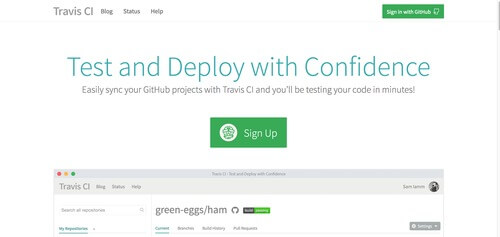
Travis CI is a CI platform that automates the process of software testing and deployment of applications. It's built as a platform that integrates with your GitHub projects so that you can start testing your code on the fly. With customers like Facebook, Mozilla, Twitter, Heroku, and others, it's one of the leading continuous integration tools on the market.
Key Features:
- Free for public open source projected on GitHub
- As simple as signing up, adding a project, and you can begin testing
- Bilingual support so your code runs smooth across all versions
- Automated pull request verification
- Works with Email, Slack, HipChat and others for easy notifications
- Extended API and CMD tools for custom management
Cost: Free for open repositories, Enterprise for private
3. TeamCity
@teamcity
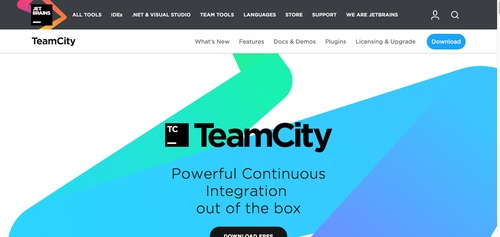
TeamCity from Jetbrains is an intelligent CI server solution for software environments of all sizes. With an ample amount of features integrated specifically for developers, you will not be disappointed by the level of performance that TeamCity adds to your team. Built to support modern software stacks and platforms, you can get started within minutes using pre-built installers.
Key Features:
- Great support for Visual Studio; tool versioning, framework testing, code coverage, code analysis, all included without any external scripts
- Intuitive foundation that can reuse settings so you don't have to duplicate your code
- Comprehensive version control for structuring your project
- Detailed history reports for builds, failures, and any additional changes made
- TeamCity takes advantage of cloud computing by dynamically scaling out its build agents farm on Amazon EC2, Microsoft Azure, and VMware vSphere
Cost: Free, Business Starting at $299
4. CircleCI
@circleci
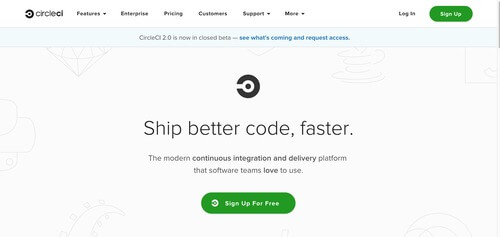
CircleCI provides a state of the art platform for integration and delivery, which has helped hundreds of thousands of teams across the globe to release their code through build automation, test automation, and a comprehensive deployment process. With a modern approach towards the needs of modern software teams, you can rest assured that CircleCI will increase productivity, scale effortlessly, and build with confidence that your team requires.
Key Features:
- Create an account, add a project, and start building. The platform can grab custom settings from your code directly
- Custom integration with Maven, Gradle, and other top-notch build tools
- Using Django, Nose, RSpec, and countless others, CircleCI will do a stellar job at testing your code, while you're busy shipping your next product
- Flawless integration with AWS, Heroku, Google Cloud, and others
- CircleCI automatically uses language-specific tools like rvm and virtualenv to ensure dependencies are installed into an isolated environment
Cost: Free, Premium Starting at $50
5. Codeship
@codeship
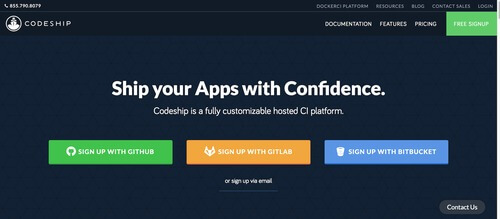
Codeship is a hosted continuous integration platform that favors efficiency, simplicity, and speed. Your teams can use Codeship to test, build, and deploy directly from your GitHub project. It also works with Bitbucket. Codeship's concise set of features combines integration with delivery so that your code is deployed accordingly once test automation has cleared.
Key Features:
- One-click signup for GitHub, GitLab, and Bitbucket
- Highly customizable with native support for Docker instances
- Efficient infrastructure that monitors and scales per your requirements
- Simple config file management, getting your workflow going quickly
- Simple UI for setting up workflows, while keeping a history of changes
Cost: Free, Starter Package at $49
6. GitLab CI
@GitLab
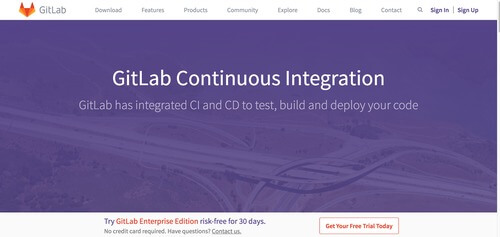
GitLab is a rapidly growing code management platform for the modern developer. It provides tools for issue management, code views, continuous integration and deployment, all within a single dashboard. From an idea to production stages, with GitLab you get to put yourself in a bird's-eye view of how your project is growing and maturing. GitLab ships pre-built packages for popular Linux distributions, it installs in minutes, has a friendly UI, and offers detailed documentation on every feature.
Key Features:
- Integrated directly into the GitLab workflow
- Add additional machines to scale your tests for performance
- CMD build scripts allow you to program them in any language
- Custom version tests to check branches individually
- Manual deployment, and effortless rollback capabilities
Cost: Free for Community Edition, Enterprise Starting at $16 per user
7. Buddy
@BuddyGit
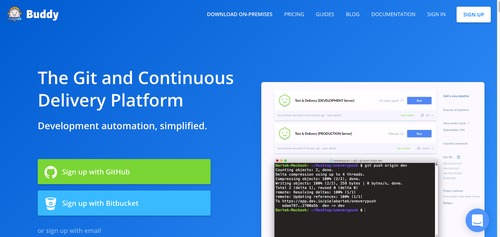
Besides the beautiful and rich user interface that Buddy web platform is rocking, you get a high-quality service for automating your development, without the complexity of using custom tools to do so. Buddy's pride is simplicity, and it shines through their automated pipeline feature which helps developers to test, build and ship their software to production quicker than ever before.
Key Features:
- Custom actions for launching containers, automating deployment, and setting up monitoring
- Concise philosophy of build, ship, and deploy that's inbuilt as part of the feature stack
- Deploys to your favorite hosting and cloud service providers
- Automated tracking algorithm with the option to rollback every time
- Custom support for Grunt. Gulp, MongoDB, and MySQL
Cost: Free, Basic Starting at $49
8. Wercker
@Wercker
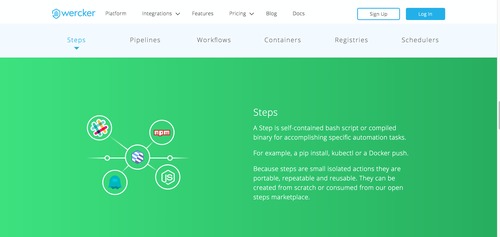
Wercker's CI/CD platform helps software teams to achieve their goals using Docker and microservices. Using container-specific and cloud-native automation features, teams can test and deploy their apps hassle-free. Wercker's customers praise the platform for being highly efficient towards an automated build and deployment process, making a clear distinction between errors and hiccups along the pipeline.
Key Features:
- Easy configuration management using YAML
- Spectacular UI of the main dashboard
- Seamless support for Bitbucket and GitHub projects
- Easy to setup for complex microservice architectures
- Concurrent pipelines for a streamlined deployment flow
Cost: Free for Community Edition, Virtual Pipelines at $350
9. Semaphore
@semaphoreci
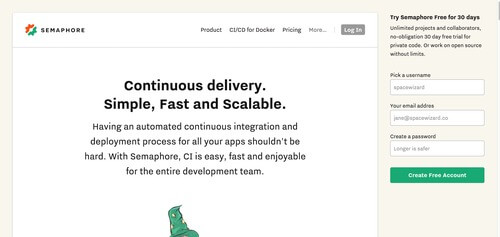
Semaphore CI provides cloud-based continuous integration and deployment built for speed and simplicity. With Semaphore your team can stay on top of the latest bugs and errors, way before they reach the attention of your users. With a seamless GitHub integration, your tests are automated the moment you plan to push out new code changes.
Key Features:
- Custom tests for dependencies, units, code style, security, and acceptance
- Custom definitions for security and style help to check each new release for compliance
- Custom reviews for pull requests on GitHub or Bitbucket, automating the build process
- Test multiple projects and branches simultaneously as you push new commits
- Define environment variables, and add custom configuration files and SSH keys
Cost: Free for 30 Days, Business at $25 per box
10. Solano Labs
@SolanoLabs
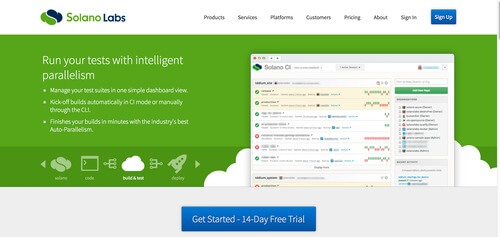
Solano Labs prides itself over its blazing fast platform for Integration and Deployment needs. Customers have reported a significant increase (up to 100x faster) in their time-saving thanks to Solano's comprehensive tools that streamline your build testing. Solano offers solutions for SaaS companies, private corporations, and cloud-oriented businesses that want to improve the efficiency of their resources.
Key Features:
- Compatible with most modern languages, including Scala and Go
- Custom Debug Console for quicker debugging workflow
- In-built load balancer to conclude tests across multiple servers
- Dynamic distribution of tasks for increased performance
- Friendly towards third-party frameworks, databases, and tools that improve development experience
Cost: Free 14-Day Trial, Premium Starting at $100
11. AppVeyor
@appveyor
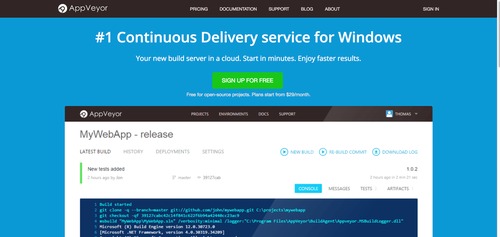
AppVeyor is a Windows-only cloud-based service for testing, building, and deploying Windows applications. Windows devs use AppVeyor's comfortable technology to conclude their tests and deploy applications in the cloud or in a physical server environment. With pre-installed software like Visual Studio and your favorite SDKs, you can quickly get up and running with a solid CI environment.
Key Features:
- Choose your GitHub project and go! All infrastructure provided by AppVeyor
- Isolated environment for builds to keep your code neatly secure
- All-in-One continuous delivery platform, nothing else necessary
- SSD drives with dedicated hardware to provide blazing fast speeds
- Custom team environments using granular methodologies
Cost: Basic at $29, Premium at $99
12. Assertible
@AssertibleApp
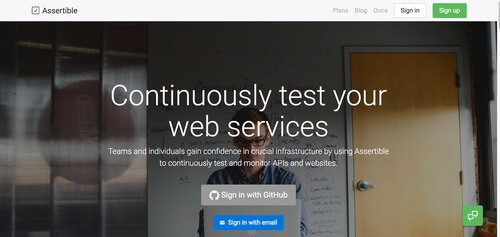
Change the way you look at quality assurance using Assertible's infrastructure for continuous testing and monitoring of your apps, websites, and API's. Assertible's strong set of features enables teams to worry less about bugs making their way into production, and rather promotes a safe testing environment where everyone has a chance to make the most out of their productive hours at work.
Key Features:
- Simple deployment process for GitHub projects
- Custom alerts for failed tests, through Email or Slack
- Automatically run your tests when you deploy new changes to staging or production
- Custom and collaborative team environment using groups
- Monitor the uptime and availability of all your critical APIs
Cost: Personal is Free, Standard at $25
13. Shippable
@BeShippable
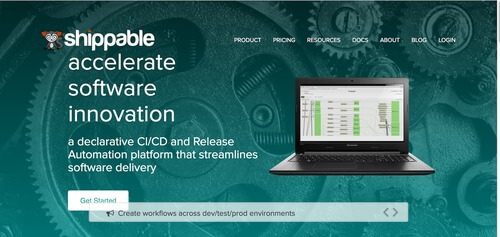
Shippable came out of the necessity to give software companies a way to accelerate their growth, without the time-consuming limits of manual labor. Shippable is an integrated platform that's built with a single purpose to help teams streamline the process of pushing apps to production, apps that have been tested and built for security and stability. Shippable's mission is to level the playing field by commoditizing custom built CI/CD platforms that companies like Facebook and Amazon rely on and enable every business to evolve faster.
Key Features:
- Acts as a unified platform that combines continuous integration, automation, and deployment
- Supports any of your favorite languages, software tools, and cloud providers
- Policy-driven permissions enable separation of duties for security and compliance
- Custom YML configs that are versioned through Git
- Built with Docker in mind, meaning you can get up and running in a fraction of minutes
- Custom reports for testing and code coverage; get a visual taste of your code environment
Cost: Free, and Premium at $25; Server options available for teams
14. Nevercode
@nevercodeHQ
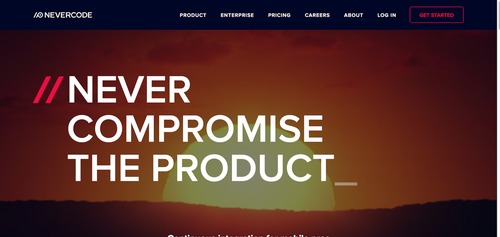
Nevercode is a cloud-based CI and CD server that automates the process of building, testing and distributing mobile applications. It requires zero assistance from human personnel, making it highly flexible and reliable at the same time. While many mobile app developers are struggling to set up and maintain their CI workflow, you won't have to worry about any of that using Nevercode's direct approach.
Key Features:
- Automated build process for any new code commits
- Custom Unit and UI tests using an emulator, or actual hardware if necessary
- Integration with common app development tools to provide a familiar development experience
- Your signing keys, passwords, and other sensitive data are stored encrypted using state-of-the-art cryptography
- Deploy apps to your favorite App Stores automatically
Cost: Free Hobby Plan, Freelance at $43. Enterprise Starting at $263 and $571 for rapidly growing companies.
15. Bamboo
@Atlassian
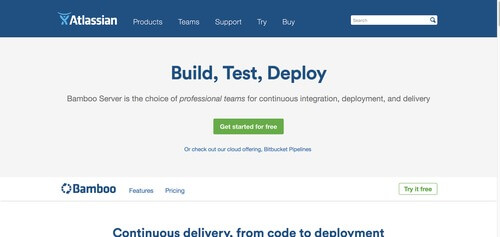
Bamboo is a CI server being used by software teams across the globe to automate the process of release management for applications and general software, allowing teams to establish a streamlined pipeline of build delivery. Bamboo gives developers a chance to automate their build and test processes, in turn freeing up time that can be spent improving the product itself. Mobile developers can deploy their apps back to the Apple Store or Google Play automatically.
Key Features:
- Use Bamboo with your favorite stack, including Docker, AWS, and S3; it works out of the box with your favorite coding language
- Custom deployment projects to archive the history of each of your release version
- Fix critical bugs quickly using custom agents that can be assigned for immediate builds
- Detailed outline of your code history before you deploy, helping you understand the progress you're making
- Compatible with Bitbucket and JIRA for a comprehensive CI experience
- With per-environment permissions, developers and QA can deploy to their own environments on demand while production stays locked down
Cost: $10 for Small Teams; $800 for Growing Teams
16. GoCD
@goforcd
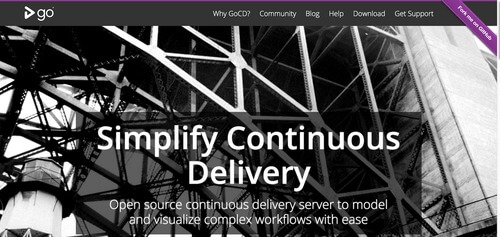
GoCD is an open-source continuous delivery server, ideal for automating and streamlining your cycle of builds, tests, and production releases. Built for individual teams and growing businesses alike, GoCD provides a business continuity concept that lets you set up multiple servers to keep your data available in the case of an emergency. Enterprise plans are available through the founding company, which is ThoughtWorks.
Key Features:
- Value Stream Map to monitor changes as they are being pushed in commits
- Custom triggers to manually save functional versions of your apps
- Understand why your builds break with an extensive test reporting pipeline
- Analyze broken pipelines through build comparison; files, and commits
- Custom template system for configuration reuse
Cost: Open Source
17. PHPCI
@php_ci
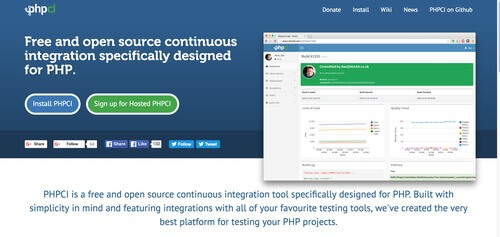
While PHPCI doesn't compare to the functionality that of Jenkins, it is a simple and easy to use continuous integration platform for PHP developers. With the fast integration of Bitbucket, GitHub, and local environment, you can have your integration process streamlined as quickly as necessary. If PHP is your daily bread and butter, then PHPCI will ensure that you're deploying apps that have survived the test of stability that PHPCI provides.
Key Features:
- Custom plugin support for popular tools and frameworks; Composer, Lint, MySQL, etc.
- Create a demo environment using test databases
- Individual directory-based plugin support
- Run builds using workers, daemons, or cron jobs
Cost: Open Source
18. Distelli
@distelli
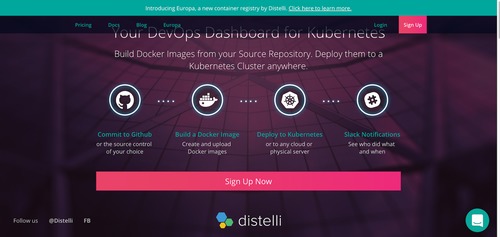
Distelli is a growing startup from Seattle that plans to change the way that devops are deploying to their servers, providing an integrated cloud-based service for doing so. With investors like Andreessen Horowitz on-board, Distelli specializes in deployment to Kubernetes, whether it's hosted on the cloud or your own physical location. A stunning cluster management dashboard lets the team build and connect clusters from anywhere while having the ability to manage them all from a single dashboard.
Key Features:
- Easy setup through using Distelli Agents
- Works with any server; private, public, physical
- Distelli is integrated with an industry trusted process manager – Supervisor – and reports the health of your application and processes
- Easily group servers into environments for fast and easy testing
- Distelli is designed to provide complete audibility and detailed insight into the who deployed what to which server
Cost: Free, $39 for Teams; $119 for Growing Business
19. FinalBuilder
@FinalBuilder
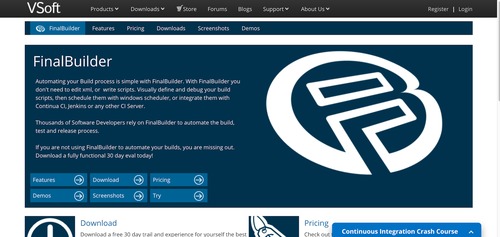
FinalBuilder from Vsoft is a Windows software for automating your build process. Despite being efficient to use by itself, it can integrate with any of your favorite CI servers, including Jenkins. The key advantage of FinalBuilder is its flexible graphics interface that provides a straight-to-the-point visual outline of your build process. It can often take a long time to evolve a batch file or script to the point where it is reliable enough for use, whereas automating the build process with an automated build tool such as FinalBuilder is quick and easy.
Key Features:
- Massive library of predefined actions that will improve the automation of your build processes
- Integrate use of Windows scheduling to schedule your builds on consistent basis
- Conditional statements to handle local errors
- Custom build reports through email; automates log collection and notifications
- Support for version control using popular systems
Cost: Starting at $599 for Professional, and $359 for Standard. $5000+ for Large Teams
20. Hudson
@hudsonci
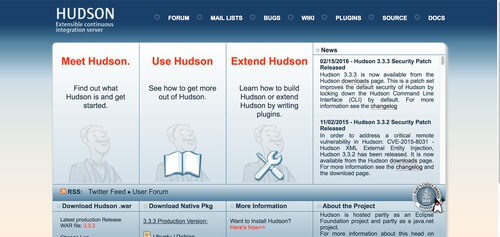
Hudson CI is written in Java based on servlet containers such as Tomcat and GlassFish. Hudson seamlessly supports your favorite SCM tools, the likes of Git, CVS and Subversion. Builds can be started by various means, including scheduling via a cron-like mechanism, building when other builds have completed, and by requesting a specific build URL.
Key Features:
- Simple web interface for setting up configurations
- Custom permalinks structure for easy linking to your build results
- Comprehensive monitoring system for real-time notifications and updates
- Hudson can distribute build/test loads to multiple computers
- Supports industry software for builds, unit testing, code analysis, security, and more
- You can browse or write your own plugins to extend native functionality
Cost: Open Source
21. Buildkite
@buildkite
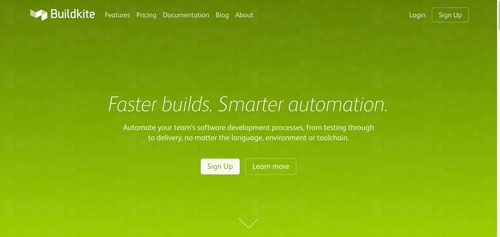
Buildkite has been in the business for the last four years, providing software developers and their respective teams with an easy way to create a self-hosted CI environment. The tool was initially born out of the frustration of the founder, who saw that there's clear lack of self-hosted CI solutions that provide effortless functionality at a fair price. Today, developers acknowledge the fast performance that Buildkite provides.
Key Features:
- Limitless choice of languages and toolchains you can use
- Native support for Docker containers, but also for Unix, Windows and OS X systems
- Control your versions using GitHub, GitLab, or any version control tool of your choice
- Distributed agents help you get the most out of your machine performance
- Web interface for triggering build pipelines
- Your code is never leaked and stays on-site, even after connecting with platforms like GitHub
Cost: $15 per user, per month
22. CruiseControl
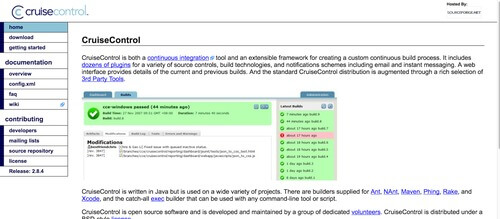
CruiseControl is an open-source framework built with Java that oversees your continuous build process. It comes equipped with a flexible web dashboard to overview the details of your builds. At its core, it's a continuous integration platform that can improve the process of developing software. Through plugins, devs can extend their workflow beyond the basic functionality.
Key Features:
- Custom build loop for build cycles
- JSP reporting for managing build results
- GUI interface for creating visual outputs of build status
Cost: Open Source
23. Integrity

Integrity is a simple Ruby-built CI server that builds, tests, and verifies your code as soon as you publish new commits. The settings are easy to navigate and simple enough for teams of all sizes to get up and running.
Key Features:
- Custom notifications using Campfire, Email, Shell, TCP, and more
- Installation takes a few lines on the command line shell
- Deploys with Thin, Unicorn, and supports Reverse Proxy web servers
Cost: Open Source
24. QuickBuild
@PMEaseQB
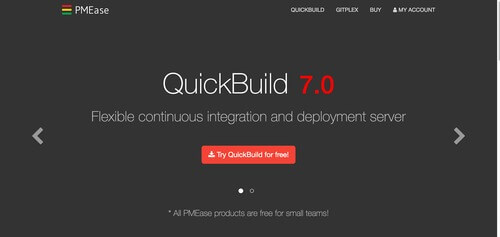
QuickBuild is a powerful platform for CI and CD streamlining. Utilizing a fast, performance-oriented core system, it gives software teams a reliable solution for creating custom scripts to manage override rules and includes a ton of useful variables for better deployment workflows. QuickBuild, although providing an open-source environment, is best recognized for its Enterprise-level plan, which comes with a premium support console where those with a license can get a more thorough understanding of their infrastructure.
Key Features:
- Build proofing to check for bugs before committing to production
- Create custom build reports in real-time
- Design complex build workflow visually, with drag and drop support
- Custom parallel agents for queueing steps in a scalable way
- Quick and easy import/export of configuration files using a neat web interface
- Cloning for all projects and builds with a single click
Cost: Free with Open Source License; $3600 for Enterprise License
25. UrbanCode
@UrbanCode
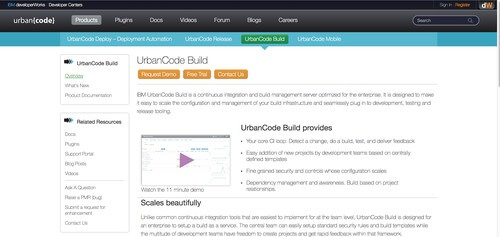
UrbanCode from IBM is built to be used by serious software companies that require a concise integration of tools for managing complex builds, which cannot be managed effectively through the use of low-level tools. Thousands of big corporations across the world are using uBuild to solve their most complex build requirements. In Agile development, uBuild is used to automate Continuous Integration builds, nightly builds, automated unit or functional tests, deployments, releases, or any other process in the application lifecycle.
Key Features:
- Concise project templates for managing a range of configurations
- The platform stores all data history so that it can later be turned into a visual data report of global activity
- Pluggable environment allows you to use external (or custom built internally) tools to compliment your workflow
- Manage your dependencies based on custom changes you make to the project outline
Cost: Free Trial; contact for a quote
26. Gump
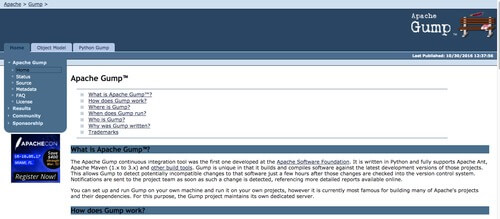
The Apache Foundation doesn't hold back when it comes to pushing out great products, and Gump is definitely among the better ones; it's an open-source CI system that provides building and testing capabilities for Java projects. At the core of Gump is a valuable tool to provide developers with a way to ensure their projects are functional and compatible at all levels of development.
Key Features:
- Gump is unique in that it builds and compiles software against the latest development versions of those projects
- Written in Python
- Nightly builds
- Newsgroup notification for failed builds
Cost: Open Source
27. Chef
@chef
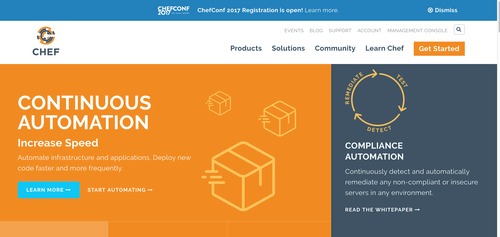
Chef has been providing software engineers with a reliable configuration management platform for the last eight years. Written with Erlang and Ruby, the main aim of Chef is to provide an automated environment for how your infrastructure is managed, deployed, and configured — regardless of the size of your network. Chef can be effortlessly integrated with cloud services, physical servers, and hybrid solutions.
Key Features:
- In-build development kit with a set of tools to automate your code infrastructure
- Transfer your apps among cloud locations with ease
- Multi-manageable capabilities for managing cloud and physical servers
- Host your server API with Chef to provide a hardened layer of uptime guarantee
Cost: Open Source with Business plans available (contact for a quote)
28. Strider
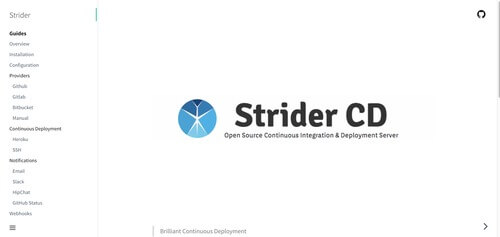
Strider's an Open Source CI & CD platform written with NodeJS and JavaScript that integrates MongoDB as the back-end database storage. Strider gains popularity among developers for its ability to enable the creation of custom testing servers, which are direct clones of the production environment.
Key Features:
- Connects with GitHub, Gitlab, and Bitbucket for automated tests
- Developers can use existing, or code their own plugins to extend features
- Easily deploys to Heroku for continuous deployment
- A well-organized Webhooks feature to add additional software functionality
- Extensive internal API with clear documentation
Cost: Open Source
29. Buildbot
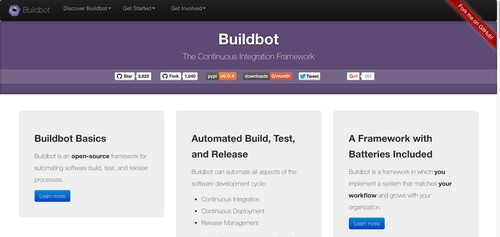
Buildbot is a Python-built CI testing framework, highly acclaimed among companies like Mozilla and Chromium. Buildbot's primary function is to act as a bridge for concluding automated tests and builds. Buildbot supports not just continuous-integration testing but also automation of complex build systems, application deployment, and management of sophisticated software-release processes.
Key Features:
- Run your builds from a selection of workers
- Custom build status notifications through Email, The Web, and similar options
- Firewalled workers will work if permissions for checkout are enabled
- Watch builds in real-time, get an estimate of time it's going to take to complete
- Custom history records for warnings, lints, compile times, and similar build data
Cost: Open Source
30. BuildMaster
@Inedo
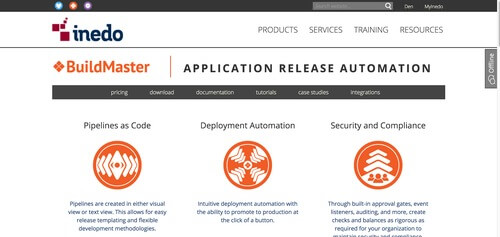
BuildMaster, from the hard working folks at Inedo, is an app release automation platform. It puts together the powerful capabilities of build management and ARA to create an automated process of continuous integration, database changes, and build deployments. As a web-based tool, it is easy to start using, and all features are ready to go at just a single click away. Configuration is achieved solely through the web user interface, so you don't have to deal with script configurations.
Key Features:
- Code pipelines that can bridge Visual and JSON
- Reuse code/scripts across all builds of your apps
- Monitor database activity to protect sensitive data
- Custom event listeners that monitor actions and/or operations
- Flexible integration with your favorite issue tracking software
Cost: Enterprise Edition Starting at $1,995 for 10 Users; Express is Free
31. Puppet
@puppetize
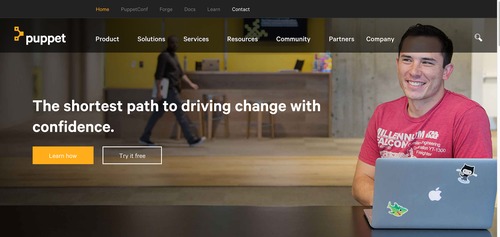
Puppet's platform is built to manage the configs of Unix and Windows systems. As software, it's an Open-Source config management tool. Puppet gives developers a way to deliver and operate their software regardless of its origin. Using Puppet's manifest, you can declare the over frame framework for your infrastructure and apps that you're building, which gives you a model to use Puppet against for testing, sharing, and deploying changes.
Key Features:
- Custom Puppet agents and consoles that consolidate your CI process
- Thousands of free-to-use modules to rapid development
- Works alongside the likes of Git and Jenkins seamlessly for a truly automated experience
- Security principles based on compliance
- Puppet makes it possible to manage nearly any IP-connected device
Cost:Free Trial, $3,000 (500 nodes) and up
32. Continuum
@apachecontinuum
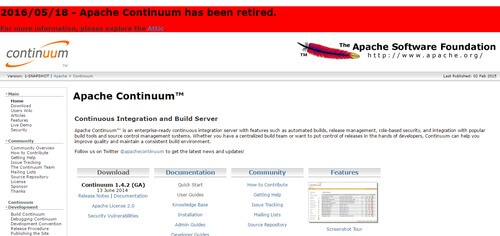
An enterprise-ready continuous integration server, Apache Continuum offers time-saving tools such as automated builds, release management, and everything you need to streamline continuous development.
Key Features:
- Role-based security
- Scheduled and forced build
- Integrates with popular build tools and source control management systems
- Automated builds
- Release management
Cost: Open Source
33. Visual Studio Team Services
@VSTeam
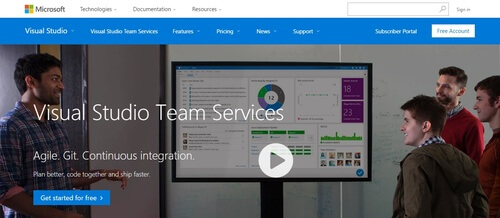
Visual Studio Team Services helps teams plan better, code together, and ship faster. You can code in any IDE and language, for any target platform, integrating your favorite tools from the marketplace to create your ideal development environment.
Key Features:
- Kanban and scrum boards
- Unlimited Git and TFVC repos
- Hosted builds
- Automated release pipelines
- Test and build commits before merging code
- Built-in tasks and templates for setting up CI and CD to an Azure web app
Cost: Free Trial for Team Foundation Server, get started with the Cloud Service free
34. Continua CI
@FinalBuilder
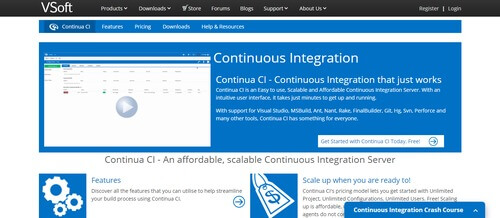
An affordable, scalable continuous integration server, Continua CI offers an intuitive user interface and supports a variety of tools you already use, such as Visual Studio, MSBuild, Ant, Nant, Rake, Git, and more.
Key Features:
- Detects changes in your source against your business logic
- Automatically runs builds
- Advanced workflow editor
- Try & Catch statements, looping, and conditional statements
- Distribute builds over multiple agents
- Separate builds into different configurations
- Issue tracker and notifications
Cost:Unlimited Project, Unlimited Configurations, Unlimited Users Free, Additional builds start at $199
35. CABIE
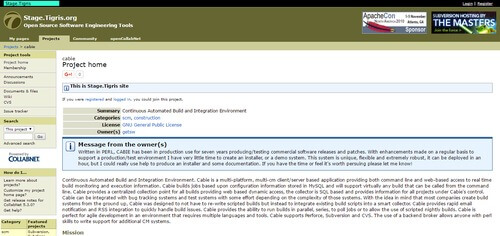
CABIE is a continuous automated build and integration environment written in Perl. It's been around and actively in use for more than seven years, making it one of the most established CI tools, particularly among Open Source options.
Key Features:
- Written in easy-to-understand Perl
- Command line interface to support scripting
- Web interface
- Rapid email build notification
- MySQL support
- Pre/Post/PostPost/Fail triggers
- Centralized Collector for jobs running on multiple servers
- Complete audit trail
- Support for ANY build called from the command-line
- Client/server command redirection
Cost: Open Source
36. Meister
@openmake
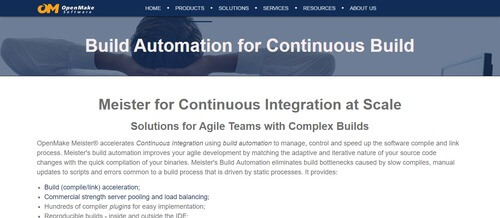
OpenMake Software is a DevOps continuous delivery platform designed for Agile methodologies, offering continuous delivery tools that enable dev teams to go the "last mile" in Agile. Meister accelerates continuous integration by using build automation to manage, control, and speed up the software compile and link process.
Key Features:
- Eliminates friction in the CD pipeline
- Build acceleration
- Hundreds of compiler plugins
- Reproducible builds both inside and outside the IDE
- Dependency management
- Build script generation and audits
Cost: Free for small teams; Flexible "Pay as You Grow" enterprise pricing starting at $1,000 per application per year
37. Vexor
@VexorCI
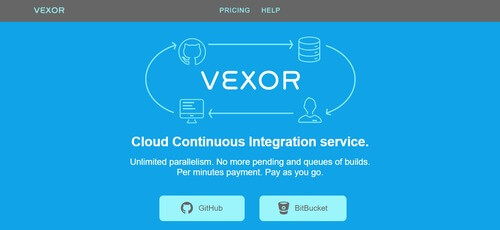
Vexor.io is a cloud continuous integration service offering unlimited parallelism with pay-per-minute, as-you-go pricing.
Key Features:
- Easily parallelize your test suite
- GitHub, Bitbucket, and Gitlab integration
- Docker-friendly
- Eliminate pending and queued builds
Cost: $0.15 per minute, 100 free minutes per month
38. Drone.io
@droneio

A continuous delivery platform built on Docker, Drone.io features a comprehensive plugin marketplace to allow developers to create custom configurations that best support their development needs.
Key Features:
- Supports GitHub, GitHub Enterprise, Bitbucket, GitLab and more
- Create custom plugins to integrate with your provider of choice
- Works with any language, database, or service that runs inside a Docker container
- Matrix builds for testing code against multiple languages, OSs, databases, and more
- Simple installation and maintenance
- Isolated builds in Docker containers
Cost: Open Source
39. Buildout
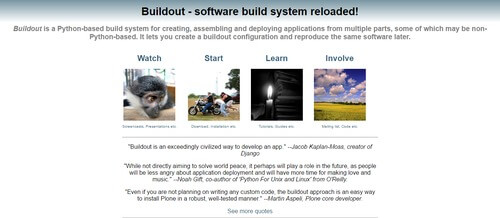
Buildout is a Python-based build system enabling you to create, assemble, and deploy applications from multiple parts — even parts not Python-based. Easily create a buildout configuration and reproduce the same software later with Buildout.
Key Features:
- Build Zope/Plone applications
- Use from local development instance to production server with a single buildout
- Build and deployment management
Cost: Open Source
40. easyCIS
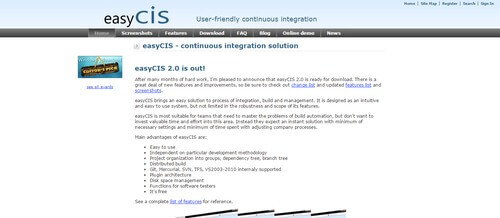
easyCIS aims to provide a simple solution to the problems associated with integration, build, and management. An intuitive and easy-to-use system, easyCIS is independent of development methodologies, meaning you can use it regardless of your working style.
Key Features:
- Complete setup and administration over web interface
- No build scripts required
- Project groups, branch trees, dependency trees
- Use build tasks from parent projects
- Continuous integration and manual build
- Automatically copies build artifacts from dependent projects across build servers
- Manually trigger project integration
- Forcing project integration including dependencies
Cost: Open Source
41. Flosum
@FlosumALM
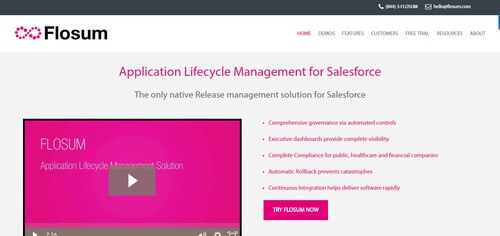
The only native release management solution for Salesforce, Flosum provides application lifecycle management for Salesforce developers, complete with executive dashboards offering total visibility and more.
Key Features:
- Comprehensive governance through automated controls
- Compliance for healthcare and financial companies
- Automatic rollback to avoid catastrophic mistakes
- Continuous integration for rapid software delivery
- Track every change across the complete delivery chain
Cost: Free Trial; contact for a quote
42. XL Deploy
@XLDeploy
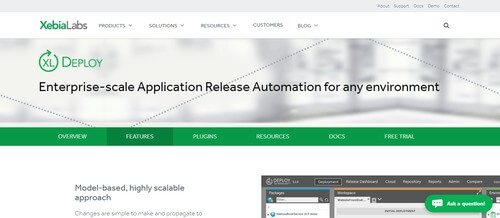
XL Deploy is a XebiaLabs offering, working best when paired with Jenkins for a consistent way to package and deploy your applications from Jenkins to all your target platforms. You get complete control for automating and scaling your deployment process with much less hassle.
Key Features:
- Models automates and manages the deployment process
- Automatically deploys applications to diverse, complex environments
- Enforces standard, repeatable processes
- Integrates with your existing environment and tools
- Dashboard with deployment analytics
- XL Release (sister product) manages advanced pipelines with ease
Cost: Free trial, contact for a quote
43. Codefresh
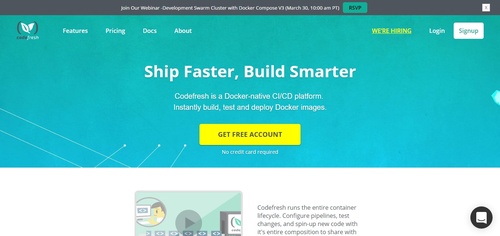
A Docker-native CI and CD platform, Codefresh helps you instantly build, test and deploy Docker images, running the entire container lifecycle from start to finish.
Key Features:
- Builds Docker images for every change in a branch or pull request
- Can monitor your Git repository or be triggered from any CI service
- Continuous unit, integration, and UI testing
- Share new feature implementations with your team
- Can auto-deploy at the end of any build process
Cost: Open Source, free for 1 build; pricing starts at $99/month for 3 builds
44. MidVision Rapid Deploy
@RapidDeployTM
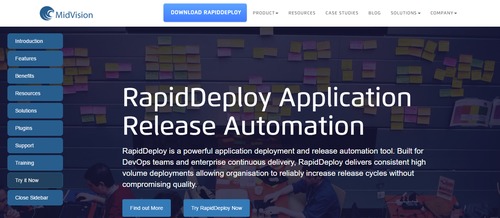
A powerful application development and release automation tool, MidVision Rapid Deploy is built for DevOps teams and enterprise CD. Delivering consistent high-volume deployments, Rapid Deploy is the robust tool enterprise developers need to support rapid development.
Key Features:
- Automated processes such as discovery of configuration, provisioning of environments, software deployment, and more
- No-code software platform
- Simple, graphical task flow editor
- Graphical pipeline to coordinate all aspects of your release
Cost: Free Community Edition for use on 5 nodes or fewer; contact for a quote
45. Cake
@cakebuildnet

Cake is a cross-platform build automation system that helps you compile code, copy files and folders, run unit tests, compress files and build NuGet packages with ease.
Key Features:
- Built on Roslyn and Mono compiler
- Write your build scripts in C#
- Available on Windows, Linux, and OS X
- Build on your own machine or build on CI systems with the same Cake functionality
- Supports MSBuild, MSTest, xUnit, NUnit, NuGet, ILMerge, WiX, and SignTool
Cost: Open Source
46. Magnum CI
@ci_magnum
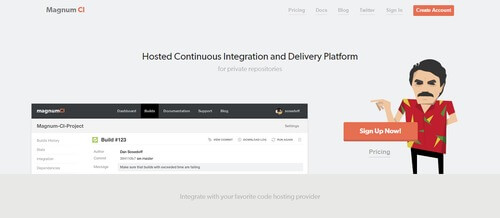
A hosted continuous integration and delivery platform, Magnum CI is made for private repositories. It integrates with your favorite code hosting provider including GitHub, Bitbucket, Gitlab, and more.
Key Features:
- Easy integration with code hosting services
- Customize build steps with your own commands
- Supports the most popular languages and databases
- Check code for dependencies automatically
- Alerts you when your libraries are out of date or code coverage is low
Cost: Currently in public beta; pricing plans to be announced soon
47. Buddybuild
@buddybuild
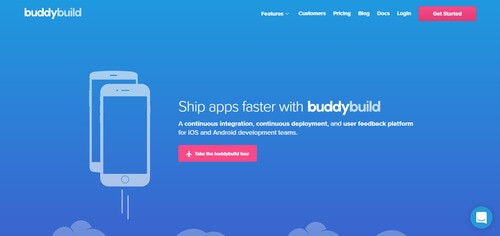
Buddybuild helps you ship apps faster with continuous integration, continuous deployment, and user feedback tools for iOS and Android development teams.
Key Features:
- Unit and UI testing
- Actionable bug reports from users
- Flexible continuous delivery
- Customizable workflows
- Mobile integration platform for iOS and Android
Cost: Pricing by plan, starting at $219/month for 3 concurrent builds
48. Phabricator
@phabricator
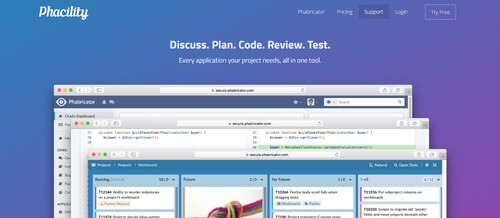
Phabricator provides all the applications your project needs in a single tool. Discuss, plan, code, review, and test from the same interface with this feature-rich tool suite.
Key Features:
- Pre-commit code review with Differential
- Supports Git, Mercurial, and SVN
- Audit source code
- Customizable task management
- Phriction, a document Wiki, to document ideas, notes, and more
- Workboards and sprints
- Chat channels
- Business rules
- Command line tools
- API
Cost: Free up to 5 users; paid plans start at $20/user/month
49. Spinnaker
@spinnakerio
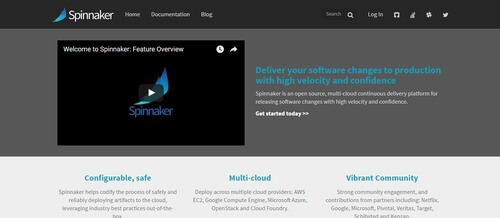
An open-source, multi-cloud continuous delivery platform for releasing rapid software changes with confidence, Spinnaker is a highly configurable, safe tool to speed development and leverages industry best practices out of the box.
Key Features:
- Integrates with a variety of cloud providers
- Integrates with Jenkins and Travis
- Support for messaging through Slack, Hipchat, email, and more
- Cluster management
- Deployment management
Cost: Open Source
50. Bitrise
@Bitrise
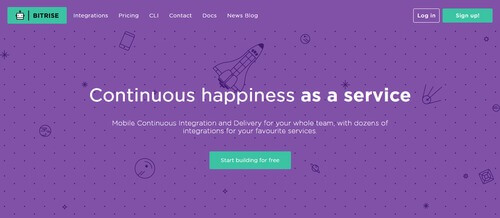
Bitrise offers mobile continuous integration and delivery with dozens of integrations for seamless operation with the services you already know and love. Build apps with Bitrise for iOS, Android, and Xamarin with consistency, confidence, and speed.
Key Features:
- Craft powerful workflows for every development stage
- Configure integrations in an intuitive UI
- Every build runs in its own virtual machine for security
- Hosted environment
- Over-the-air app deployment
- GitHub pull request support
Cost: Bitrise provides open source tools and a hosted CI service priced at $50/concurrent build
51. OctopusDeploy
@OctopusDeploy
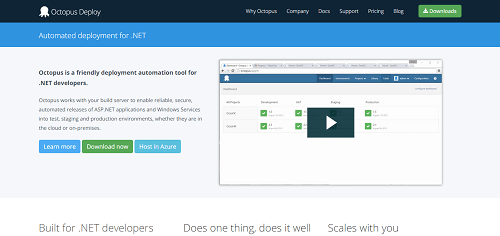
OctopusDeploy works with your build server to automate releases of ASP .NET applications and Windows services. OctopusDeploy enables reliable, secure, and automated releases into several different environments — including test, staging, and production — both on-premises and in the cloud. Instead of replacing your source control and build servers, OctopusDeploy takes over where they leave off, taking your build artifacts and configuring and distributing them to all machines and environments you need them to run on.
Key Features:
- Pulls and compiles code from your source control system
- Handles build-related tasks such as static code analysis
- Runs unit tests and tracks code coverage over time
- Integrates with JetBrains TeamCity and Microsoft Team Foundation Server
- Comprehensive REST API and a .NET client library
- Intuitive dashboard shows which versions are deployed to which environments
- Deploy on-premises or to the cloud
- Configurations and scripting
- Enable self-service deployments
Cost: Free for small teams, even for commercial use. Professional plans start at $700; Enterprise plans start at $5,000/year.
- About the Author
- Latest Posts
- Top .NET Developer Skills According to Tech Leaders and Experts - October 20, 2021
- What to Do About Java Memory Leaks: Tools, Fixes, and More - September 3, 2021
- What is Load Testing? How It Works, Tools, Tutorials, and More - February 5, 2021
- Americaneagle.com and ROC Commerce stay ahead with Retrace - September 25, 2020
- Stackify's New Pricing: Everything you need to know - September 9, 2020
Source: https://stackify.com/top-continuous-integration-tools/
0 Response to "Popular Tool Used for Continuous Integration"
Post a Comment